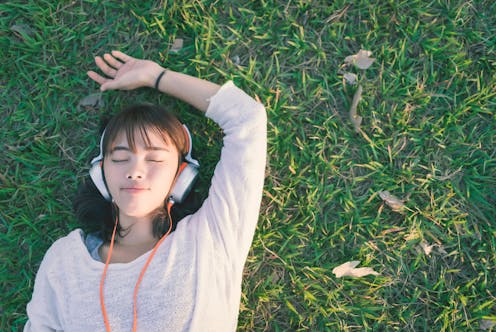What are 'binaural beats' and do they affect our brain?
- Written by Monica Barratt, Vice Chancellor’s Senior Research Fellow, Social and Global Studies Centre and Digital Ethnography Research Centre, RMIT University

You might have seen online or heard about “binaural beats”, which have been described as “digital drugs[1]”.
Listening to binaural beats has been claimed to help[2] with sleep, stress, anxiety and cognition[3], and there’s much discussion online[4] about whether or not they can cause a “high” similar to drugs.
But what actually are they? And what’s the evidence for beneficial or mood-altering effects?
What are binaural beats?
The perceptual phenomenon of binaural beats was discovered by Heinrich Wilhelm Dove in 1841[5] and first described in scientific literature in 1973[6].
The perceptual auditory illusion created by binaural beats occurs when two pure tones of slightly different frequencies are presented to each ear. These two tones are then processed within our brains to sound like a third frequency. This third frequency is thought to produce a range of effects[7], including relaxation and attentiveness.
Academic research has focused on two main uses for binaural beats:
1) as a medical treatment or therapy
2) as a substitute for or complement to psychoactive drug use (drugs that affect the nervous system and alter perception, mood, cognition or behaviour).
Read more: Sounds like hype: there's scant evidence the 'binaural beats' illusion relaxes your brain[8]
Binaural beats as therapy
Research[9] investigating binaural beats has found positive effects for pain alleviation, anxiety reduction, and memory. However, there have been conflicting findings around its effects on concentration.
For example, a meta-analysis[10] that included 22 studies on the effect of binaural beats on memory, attention, anxiety and pain relief found across all studies a statistically significant and consistent effect. A dose-response effect was found, meaning greater exposure to the sounds increased their effectiveness as a therapy.
Studies using high-quality designs have also consistently shown effects: using a double-blinded randomised control cross-over trial[11] (the gold standard of clinical study), binaural beats reduced pain intensity, stress and use of analgesic drugs in chronic pain patients, compared with a placebo stimulation.
Studies looking at improving attention haven’t found evidence of an effect[12].
Binaural beats can be positioned within a range of other commonly used digital sound-based therapies such as ASMR (Autonomous Sensory Meridian Response). Emerging research indicates ASMR may have therapeutic benefits[13] for mental health, which highlights the broader potential of digital sounds.
Binaural beats as digital pleasures
Binaural beats have also been incorporated into music, soundscapes and other consumer-facing products, including meditation tracks.
Some of these soundscapes have been marketed via mobile phone apps as digital drugs. Binaural beat tracks available to download are sometimes named after specific drugs, for example “Molly Rave Riot” (reference to MDMA) or “Roofie Enhanced calm” (reference to Rohypnol).
There is limited literature concerning digital drugs as substitutes for, or used in combination with, psychoactive substances. For example, binaural beats were mentioned in a paper[14] investigating drug combinations on a public internet forum. Participants “frequently described listening to binaural beats while using substances to enhance the experience”.
Our paper[15], released today, surveyed over 30,000 respondents via the Global Drug Survey[16], finding 5% reported binaural beat use in the last 12 months.
Supporting the idea these binaural beat tracks are used to enhance drug use experiences, we found respondents who had recently used cannabis, psychedelics or novel drugs were more likely to also report use of binaural beats.
Read more: It's not all in your mind: how meditation affects the brain to help you stress less[17]
The most common reported reasons for use of binaural beats in this sample included to relax or fall asleep, to change mood-state and to get a similar effect to that of other drugs. Qualitative responses also indicate use for pain relief for common ailments such as headaches and migraines.
In this survey sample, binaural beats were accessed primarily through video streaming sites on mobile phones.
Are binaural beats psychoactive?
Currently it’s unclear whether binaural beats are similar in effect to the psychoactive drugs they are promoted to simulate.
Given there are studies showing some effects of reducing anxiety and relieving perceptions of pain in medical contexts, it may also be possible binaural beats marketed as producing psychoactive drug effects could be perceived by consumers as providing similar sensations.
Controlled laboratory studies comparing ingestible psychoactive drug effects with those of binaural beat substitutes would be useful to answer this question.
Our research demonstrates some people who responded to our survey, and already consume drugs, are also using binaural beats to augment or substitute psychoactive substances.
Depending on their actual efficacy, a future where drug experiences can be downloaded (or streamed), rather than obtained from illegal markets, is intriguing, and poses questions that will traverse legal, clinical, and social domains.
We would like to acknowledge the other coauthors of our study, including Lachlan Goold, Adam Winstock and Jason Ferris.
References
- ^ digital drugs (soundcloud.com)
- ^ claimed to help (www.healthline.com)
- ^ cognition (csuglobal.edu)
- ^ discussion online (www.quora.com)
- ^ 1841 (gizmodo.com)
- ^ first described in scientific literature in 1973 (pubmed.ncbi.nlm.nih.gov)
- ^ range of effects (www.frontiersin.org)
- ^ Sounds like hype: there's scant evidence the 'binaural beats' illusion relaxes your brain (theconversation.com)
- ^ Research (link.springer.com)
- ^ meta-analysis (link.springer.com)
- ^ a double-blinded randomised control cross-over trial (onlinelibrary.wiley.com)
- ^ an effect (pubmed.ncbi.nlm.nih.gov)
- ^ therapeutic benefits (journals.plos.org)
- ^ paper (www.frontiersin.org)
- ^ Our paper (onlinelibrary.wiley.com)
- ^ Global Drug Survey (www.globaldrugsurvey.com)
- ^ It's not all in your mind: how meditation affects the brain to help you stress less (theconversation.com)
Read more https://theconversation.com/what-are-binaural-beats-and-do-they-affect-our-brain-180235

















